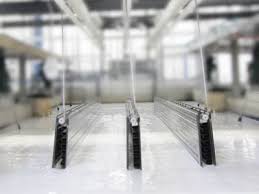Our Products/ Chemical/ / Thin Film/Zirconium
Thin Film/Zirconium
| Product Inquiry |
Thin Film/Zirconium conversion coatings are modern/state-of-the-art pre-treatment solutions which are more sustainable substitutes to zinc and iron metal phosphate coatings. The coatings provide superior paint adhesion and corrosion protection while significantly reducing environmental impact.
These cohesive, inorganic, high-density coatings are significantly thinner (<100 nm) than traditional zinc phosphate coatings and have been developed for all metal surfaces, e.g. steel, zinc, and aluminum. The Thin Film/Zirconium technology contains no heavy metals, reduces the complexity of the pre-treatment process, and leads to superior corrosion resistance with minimal environmental impact. Additionally, Henkel’s M-NT range enables our customers to process a high amount of aluminum in the metal mix while delivering on a number of other key benefits:
-
Reduced energy and water use
-
Reduced chemical consumption
-
Reduced sludge generation
-
Fewer processing steps
-
A unique process for Aluminum pretreatment is the Etch-Passivation-Process or 2040-process. Typically, any of the Aluminum pretreatment processes involve deoxidizers and etchants for metals help to remove oxides and contaminations from the metal surface - a process called surface etching. This is an essential part of the aluminum surface preparation for painting. Subsequently, a passivation coating is applied on the surface.
In order to reduce the floorspace required for an Aluminum passivation line, Henkel has developed the so called etch-passivation-process or 2040-process combining the deoxidizer and passivation stage into one. This significantly reduces the number of rinse stages and, thus, floorspace required as well as chemical consumption.
The 2040-process starts with an alkaline degreaser to remove dirt, grease, and oil from the surface. In the etch-passivation stage the surface is slightly etched and simultaneously a thin Titanium-conversion coating is applied on the Aluminum offering excellent corrosion resistance and paint adhesion.
2040-coating can be used to stabilize the surface resistance of the parts, as the Ti-conversion layer prevents the re-oxidation and re-passivation of the Aluminum surface for several weeks up to months. Due to this surface stabilization it is possible to process parts like structural castings or battery boxes in welding and adhesive bonding processes long after they have been treated. This process is approved and specified for the use on such components by the major OEMs, e.g. VW TL 82428, DBL 4952.11 and many more.









